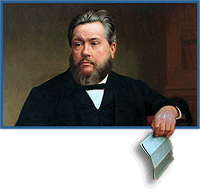posted by Phil Johnson
 The PyroManiacs devote some space each weekend to highlights from The Spurgeon Archive. The following excerpt is from "The Great House and the Vessels in It," a sermon preached Sunday Morning 8 April 1877, at the Metropolitan Tabernacle, London.
The PyroManiacs devote some space each weekend to highlights from The Spurgeon Archive. The following excerpt is from "The Great House and the Vessels in It," a sermon preached Sunday Morning 8 April 1877, at the Metropolitan Tabernacle, London.
 NE of the most serious calamities which can befall a church is to have her own ministers teaching heresy: yet this is no new thing, it has happened from the beginning.
NE of the most serious calamities which can befall a church is to have her own ministers teaching heresy: yet this is no new thing, it has happened from the beginning.
Paul and Peter and James and John in their epistles had to speak of seducers in the churches, even in those primitive days, and ever since then there have arisen in the very midst of the house of God those who have subverted the faith of many, and led them away from the fundamental truths into errors of their own inventing.
The apostle compares this to a gangrene, which is one of the most dangerous and deadly mischiefs which can occur to the body. It is within the body; it eats into the flesh deeper and deeper, festering and putrefying, and if it be not stopped it will continue its ravages till life is extinguished by "black mortification." False doctrine and an unchristian spirit in the midst of the church itself must be regarded as such a gangrene, a silent wolf ravenously gnawing at the heart, the vulture of Prometheus devouring the vitals: no external opposition is one-half so much to he dreaded.
Yet here is our comfort when distressed at the evils of the present age, among which this is one of the chief, that the truth abides for ever the same, "The foundation of God standeth sure." There is no moving that. Whether ten thousand oppose it or promulgate it, the truth is still the same in every jot and tittle; even as the sun shineth evermore, as well when clouds conceal its brightness as when from a clear sky it pours abroad a flood of glory.
The lovers of profane and vain babblings have not taken away from us, nor can they take from us, the eternal verities: the Lord liveth, though they have said, "There is no God." The precious blood of Jesus has not lost its efficacy, though divines have beclouded the atonement; the Spirit of God is not less mighty to quicken and to console though men have denied his personality; the resurrection is as sure as if Hymeneus and Philetus had never said that it is passed already; and the eternal covenant of grace abides for ever unbroken though Pharisees and Sadducees unite to revile it.
The foundation of God standeth sure, and moreover the foundation of the church remains sure also, for, blessed be God, "the Lord knoweth them that are his." All that God has built upon the foundation which he himself has laid keeps its place, not one living stone that he ever laid upon the foundation has been lifted from its resting place. Earthquakes of error may test the stability of the building and cause great searching of heart, but sooner shall the mountains which are round about Jerusalem start from their seats than the work or word of the Lord be frustrated. The things which cannot be shaken remain unaltered in the very worst times.












1 comment:
Good words.
Post a Comment